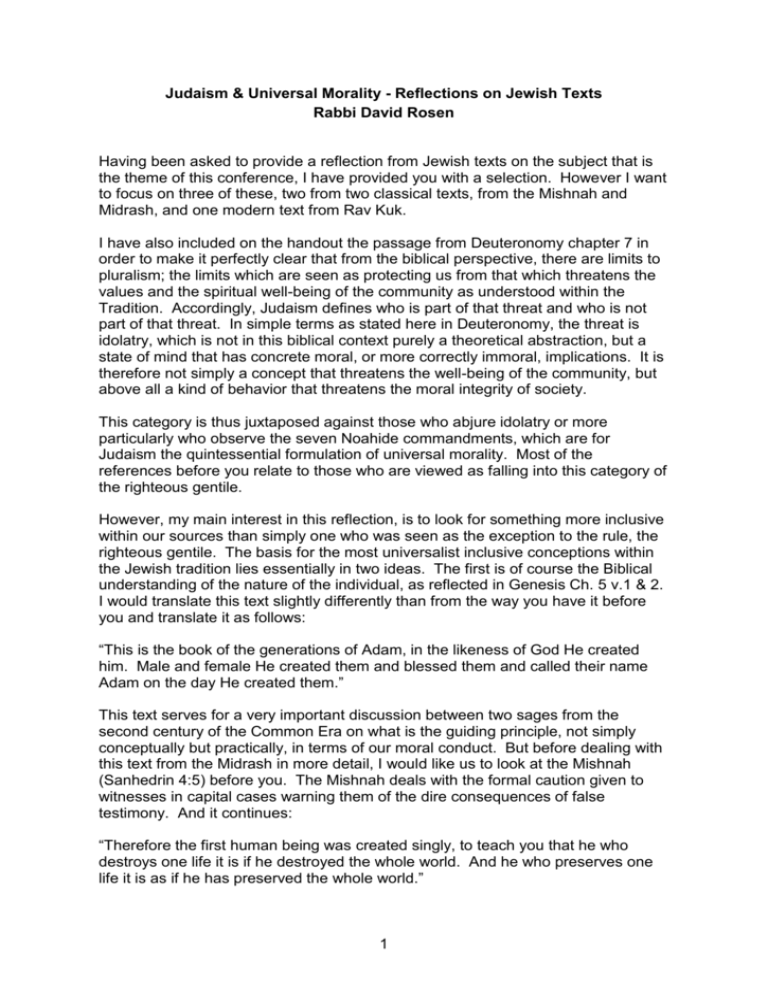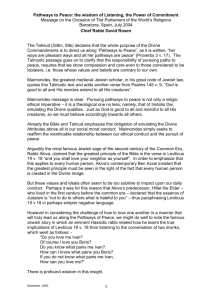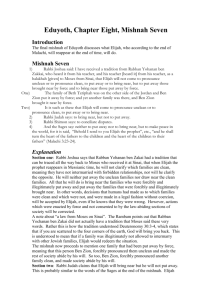Judaism & Universal Morality - Reflections on Jewish Texts re
advertisement

Judaism & Universal Morality - Reflections on Jewish Texts Rabbi David Rosen Having been asked to provide a reflection from Jewish texts on the subject that is the theme of this conference, I have provided you with a selection. However I want to focus on three of these, two from two classical texts, from the Mishnah and Midrash, and one modern text from Rav Kuk. I have also included on the handout the passage from Deuteronomy chapter 7 in order to make it perfectly clear that from the biblical perspective, there are limits to pluralism; the limits which are seen as protecting us from that which threatens the values and the spiritual well-being of the community as understood within the Tradition. Accordingly, Judaism defines who is part of that threat and who is not part of that threat. In simple terms as stated here in Deuteronomy, the threat is idolatry, which is not in this biblical context purely a theoretical abstraction, but a state of mind that has concrete moral, or more correctly immoral, implications. It is therefore not simply a concept that threatens the well-being of the community, but above all a kind of behavior that threatens the moral integrity of society. This category is thus juxtaposed against those who abjure idolatry or more particularly who observe the seven Noahide commandments, which are for Judaism the quintessential formulation of universal morality. Most of the references before you relate to those who are viewed as falling into this category of the righteous gentile. However, my main interest in this reflection, is to look for something more inclusive within our sources than simply one who was seen as the exception to the rule, the righteous gentile. The basis for the most universalist inclusive conceptions within the Jewish tradition lies essentially in two ideas. The first is of course the Biblical understanding of the nature of the individual, as reflected in Genesis Ch. 5 v.1 & 2. I would translate this text slightly differently than from the way you have it before you and translate it as follows: “This is the book of the generations of Adam, in the likeness of God He created him. Male and female He created them and blessed them and called their name Adam on the day He created them.” This text serves for a very important discussion between two sages from the second century of the Common Era on what is the guiding principle, not simply conceptually but practically, in terms of our moral conduct. But before dealing with this text from the Midrash in more detail, I would like us to look at the Mishnah (Sanhedrin 4:5) before you. The Mishnah deals with the formal caution given to witnesses in capital cases warning them of the dire consequences of false testimony. And it continues: “Therefore the first human being was created singly, to teach you that he who destroys one life it is if he destroyed the whole world. And he who preserves one life it is as if he has preserved the whole world.” 1 The very question as to why the first human being was created singly arises of course from the fact that in the story of Creation, all creatures are created in couples and ultimately Adam is separated into both male and female. If Adam is going to be separated into male and female anyway, then why didn’t God save Himself the whole business and create them to begin with as separate individuals, just as He did with all other creatures? Therefore the sages tell us that the reason for the creation of one human person singly, is to convey a moral message. There is of course an essential moral message in the text in the very union of male and female together, establishing the fullness of Adam, and therefore the Talmud says (in Tractate Yebamot folio 62) that he who does not have a spouse is not a complete human being. In other words from a Jewish perspective, marriage is the ideal state for human fulfillment. But the Mishnah does not focus on that particular moral message. It focuses upon what it sees to be the most basic moral message of the idea of the creation of the single human person. Namely the supreme sanctity of human life to the extent that each person is seen as a whole world. But the moral message goes further. The text of the Mishnah continues: “And (also) a single human being was first created for the sake of peace amongst mankind, so that no person can say to another, my father was greater than yours.” In other words, the purpose is also to emphasize our common humanity. The text continues: “and (another reason why) a single person was created first (was in order) to proclaim the greatness of the Holy One, Blessed Be He. For when a human being (mints coins, he) uses one mold (and) all the coins are identical. But the King of Kings coined every man out of the mold of the first human being and not one is like the other (each person is unique). Therefore every person is obliged to say, the world was created for me.” Of course, the Talmud goes on to say we should keep our sense of proportion and remember that the mosquito was created before the human and that moreover a person should always acknowledge in addition to the fact that he or she is a world in himself or herself, that we are but dust and ashes. In other words, there has to be a creative tension between avoiding arrogance and at the same time appreciating one’s worth and value as a human being created in the image of God. Thus the Mishnah not only seeks to impress upon us the supreme value of human life and dignity, but also to direct our moral conduct accordingly. This is further explicated in the famous Midrashic text to which I have already alluded, namely the discussion between Rabbi Akiva and his contemporary Ben Azzai on what is the principle moral rule of the Torah, of Judaism. The text appears in two different locations – in a very limited form in Genesis Rabba and in a larger form in the Sifra. But what I have presented you with here in the central text on the second page is the combination of those two fragmentary texts as presented by the very important Midrashic commentary, the Matnot Kehuna, which explains that these two fragmentary texts need to be put together in order to understand the fullness of the discussion between these two sages and the deeper 2 implication of the text. In Genesis Rabbah it simply appears to be a discussion without any explanation. One sage, Rabbi Akiva, says that the central guiding principle for moral conduct is the commandment in Leviticus (19 v.18) to love one’s neighbor as oneself, whereas his contemporary Ben Azzai says that the guiding principle is that every human being is created in the image of God (based on Genesis 5 v.1). A cursory view of this discussion would suggest perhaps, that there is a debate between a more particularist moral worldview and the more universalist moral weltanschauung. Ben Azzai would then be making the same point that Jesus does in the story of the good Samaritan. According to this interpretation Ben Azzai is saying to Akiva, that while the commandment to love your neighbor as yourself is most important, people might nevertheless become selective in their interpretation of who is their neighbor. Therefore we should emphasize that every human being is created in the image of God, so that the universal responsibility that God demands of us, is clear to each and every person. Of course this message is very important, but it is a questionable interpretation of the debate. To begin with, if you go through the Mishnah and the Talmud, and you look to see who of the sages most frequently uses the phrase that the human being is created in the image of God, you will find that it is precisely Rabbi Akiva. It is Akiva who in the Mishnah (Ethics of the Fathers, Ch. 3 Mishnah 14) says: “beloved is the human being that is created in the image of God”. When Akiva wants to impress upon us how serious murder is as the greatest offense, he says: “he who spills blood diminishes the Divine Image” (i.e., it is as if he destroys a piece of God Himself). For it is written “in the image of God He created him” (Tosefta, Yebamot Ch. 8). So there is nobody amongst all the sages of the Mishnaic period who uses this language emphasizing precisely the value of every human being created in the image of God, more than Akiva. So the issue here is not that Rabbi Akiva is somehow more particularist or insular than Ben Azzai. Exactly why Akiva prefers the golden rule here, is a subject for further discussion that I will be very happy to develop at a future opportunity. But what we are interested primarily in understanding now, is Ben Azzai’s concern. Why does he think that the golden rule is inadequate? Ben Azzai’s concern here is of course not with Akiva’s weltanschauung, but rather with the misinterpretation or abuse of the text. And here with the benefit of the Matnot Kehuna who puts the text together as we have it now before us, we can understand exactly what is Ben Azzai’s concern. Ben Azzai responds that the idea that the human being is created in the image of God is an even greater principle for moral conduct than the principle ‘love your neighbor as yourself’, because: “you should not say ‘in as much as I have been despised, so let my fellow be despised with me, in as much as I have been cursed let my fellow be cursed with me.” In other words, Ben Azzai is warning against the danger of making one’s subjective experiences the basis for one’s moral conduct. It is not only the immorality of titfor-tat; not only the fear that an individual’s lack of self respect will mean lack of respect for other’s dignity; it is also and above all the danger of relativizing one’s moral responsibilities to all other human beings. For regardless of how you have 3 been treated; no matter how badly others may heave dealt with one or one’s people, we are still obliged to behave towards others with respect for their lives and dignity, simply by virtue of the fact that each and every person is created in the Divine Image. And here comes the punch line of the Midrashic text: “Said Rabbi Tanhuma, ‘if you do so (i.e., if you say because I have been despised let my fellow be despised), know whom you despise, ‘for in the image of God He made the human person’”. In other words, any act of disrespect to another human person, is an act of disrespect towards God Himself! It is not possible to be truly God fearing, says Rabbi Tanhuma, unless one behaves with respect towards all human beings. There are undoubtedly special categories of relationships in Judaism. There are different categories of responsibilities within the Jewish people (e.g., family and community) and there are as mentioned earlier, different categories outside the Jewish people, such as the distinction between righteous gentiles and idolaters. Rabbi Menachem HaMeir (14c) emphasized the unique relationship for Jews with both Muslims and Christians (his position served as the basis for Chief Rabbis Kuk and Herzog in their confirmation of full civil rights for Muslims and Christians in a Jewish State), and leading rabbis such as Rabbi Moshe Rivkes (17c) and Rabbi Yaacov Emden (18c) emphasized the particular special relationship between Christianity and Judaism. However these distinctive categories, do not detract from the all embracing foundational principle for universal moral conduct towards all human persons expressed powerfully and beautifully in these texts. This idea acquires further exquisite exposition in this text (Mussar Avicha p.96, quoted in Z. Yaron, The Teachings of Rav Kuk, p. 30-6-7) written by Rav Kuk, the first Ashkenzi Chief Rabbi of the yishuv in Israel. What a tragic paradox it is that this great man’s thought is so widely prostituted today on the altars of religious nationalist extremism and xenophobia. As this text makes patently clear, Rav Kuk’s world outlook reflected the antithesis of religious nationalist chauvinism. “Despite the differences of understandings between the Religions and Faiths and despite the distinctions of races and environments, it is the right thing to (seek to) fully understand the different peoples and groups in order to know how to base universal human love on practical foundations. For only within the soul that is replete with love of all beings and (above all) love of humanity, is the love of (one’s own) nation able to reach its full nobility and spiritual and practical greatness. Disparagement that leads one to see anything outside the parameters of one’s particular people (for example, in the case of the Jewish people) even that which is outside the parameters of Israel, as only (consisting of) ugliness and impurity, is one of the most terrible forces of darkness that lead to general destruction of all the positive spiritual development for whose light every refined soul aspires.” “One must strive greatly to love other beings so that (such love) will fill every chamber of the soul, so that one’s love of humanity will extend to every other human person.” 4







